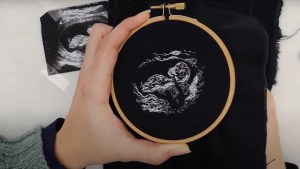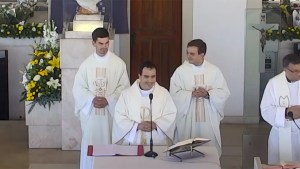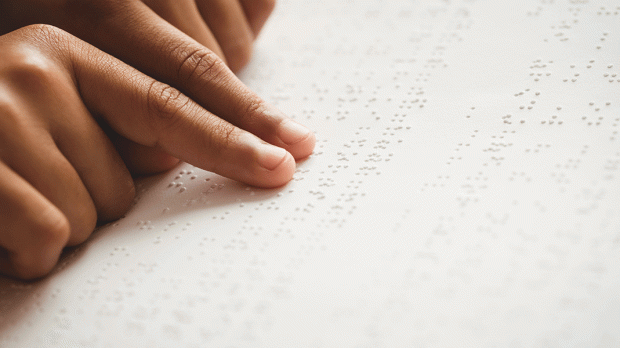Father Jamie Dennis knew he wanted to be a priest as early as 8 years old. “I used to play Mass outside on a hay bale, using a dog dish and a coffee can,” he recalls. But there seemed to be a major obstacle to his vocation: He happens to be blind.
“Before I was ordained, I feared that there would be difficulties because of my blindness,” he said in an interview with the Xavier Society for the Blind. “That was what I was continuously told by the seminary, but that has proven to not be true.”
His visual impairment has been nowhere near the obstacle he once feared it would be. “To the people that I serve, blindness is not an issue,” he said.
A key reason that his blindness has been a non-issue in his ministry is the Xavier Society for the Blind. Xavier Society provides religious, spiritual, and inspirational reading materials in Braille and audio to blind and visually impaired individuals worldwide, at no charge.
“We deliver faith and inspiration in Braille and audio,” said Malachy Fallon, Executive Director of the Xavier Society, in an interview with Aleteia. “Publication and distribution of the Mass Propers in Braille is not available from any other source.”
This service makes an enormous difference for visually impaired Catholics like Father Jamie. He receives the Sunday Propers for the Mass in Braille each week, thanks to the Xavier Society.
“I prefer to use Braille, so these publications of the readings and Mass prayers enable me to use Braille exclusively when I celebrate Sunday Masses and higher feast days,” he said.
Many other personal testimonies from visually impaired Catholics can be found on the Society’s website. The site has information about how to access their Braille services and audio services. Many titles are available on the site in BRF (Braille ready file), including the Propers of the Sunday Mass, which can be downloaded from the website
Besides the Mass Propers, the Xavier Society provides a wide array of titles in Braille on religious, spiritual and inspirational topics. Without the Xavier Society, these important sources of spiritual formation would not be available to visually impaired Catholics.
“We offer biographies on the saints; the Bible; novenas and other devotional prayers; textbooks for children in catechetical classes; papal encyclicals; and materials for prayer and study groups,” Fallon said. “Our certified Braille transcriber completes many special projects for patrons who often request a special book or prayer pamphlet. Many of the books we produce are requested by our patrons, while others are selected by our staff. We try to anticipate what books will have wide appeal.”
The Xavier Society offers patrons the following services:
- transcribing and producing the Mass Propers (Missalette) in Braille for our clients who overcome daily challenges to actively participate in Mass and in many instances serve as lectors
- fulfilling custom requests for faith formation textbooks for children and study guides for adults in Braille when these resources might not be available from other sources
- creating audio books and books in Braille while maintaining over 1,800 titles in Braille and audio related to the Catholic Church, religion, and spiritual and inspirational themes for blind and visually impaired people of all faiths seeking to deepen their faith and spirituality
- transcribing and producing The Xavier Review (newsletter sent to 800 patrons detailing new additions to our Braille and audio libraries) and The Catholic Review (compendium of articles of interest from religious periodicals sent to 650 patrons) in Braille three times each year
All of these spiritual resources are provided to blind and visually impaired Catholics at no cost, thanks to the generosity of many donors. That’s been the case since the organization was founded over 120 years ago. Fallon shared the moving story of the Xavier Society’s founding:
Originally our mission was envisioned by a blind teacher of blind children, Margaret Coffey, and Fr. Joseph Stadelman, SJ. For years and years Margaret had prayed “that God would inspire someone to take pity on the Catholic blind of the country for whom there was no Catholic book to be had.” In addition to providing inspiration for Xavier Society, Margaret provided $350 of her own resources … to purchase a recently developed stereograph machine which would allow the production of a larger volume of books and magazines in ‘raised print,’ now called Braille. While not considered a significant sum today, in 1900 $350 was a very large investment for a young blind woman. Thanks to Margaret’s generosity, XSB acquired this ‘new technology’, and soon produced its first book, The Baltimore Catechism.
As technology has advanced by leaps and bounds since 1900, the Xavier Society has advanced along with it, seeking ever more efficient and innovative ways to serve the community of visually impaired Catholics.
Some patrons have been part of this progress over the years they have used the Xavier Society’s services. Father Larry Gillick, SJ, is the director of the Ignatian Spirituality Center at Creighton University. He has been a Xavier Society patron for decades.
“It has been quite a life of being assisted by Xavier Society, from those old bulky hand-Brailled on only one side of the sheet to now, with all the advancements with which Xavier has kept up,” he said in an interview with the Xavier Society. “I personally am deeply thankful for this group over the past 57 years. The Xavier Society has been and remains an amazing friend to me.”

Read more:
Embroidered ultrasound allows blind dad to “see” his unborn baby

Read more:
First blind man ordained to the priesthood in Portugal celebrates Mass in Fatima

